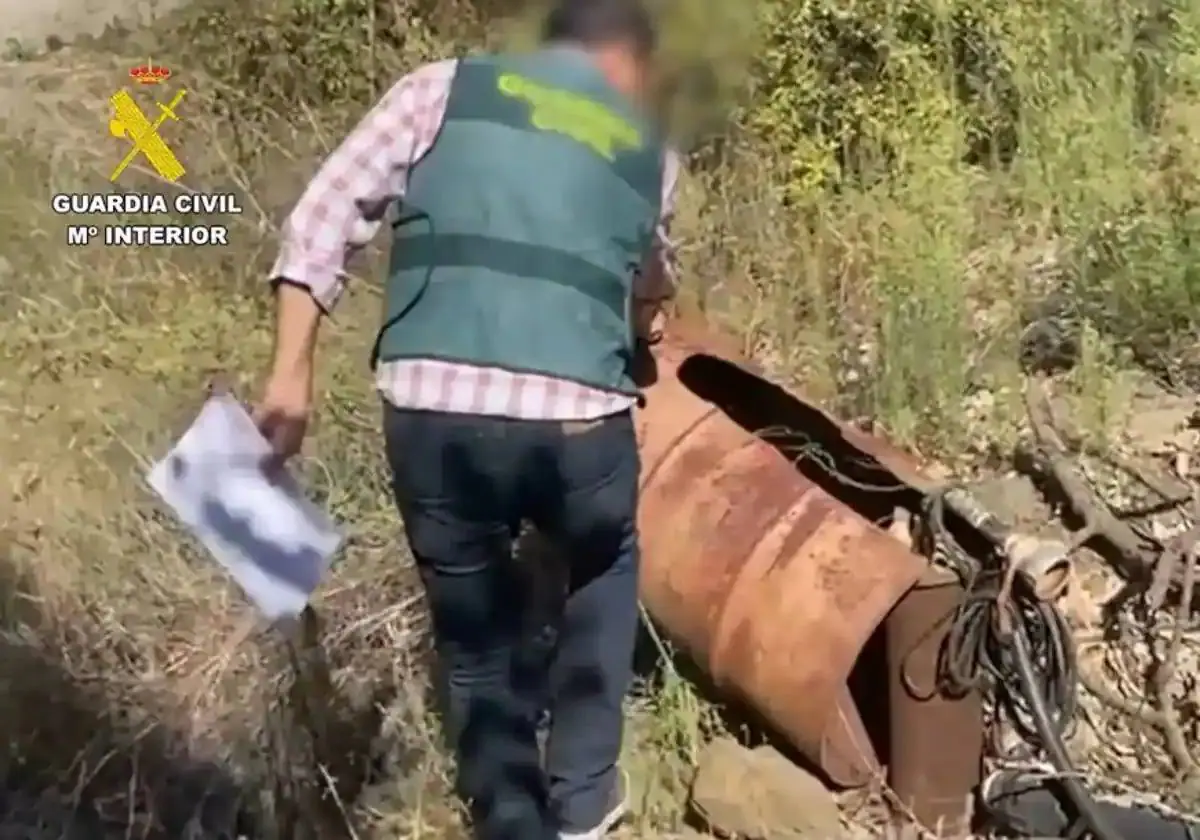

Sections
Highlight

Eugenio Cabezas
Axarquía
Thursday, 8 February 2024, 20:27
The Guardia Civil’s Operation Chaak, which is investigating illegal wells in the Axarquía area to the east of Malaga province is “just the tip of the iceberg” according to those involved in the investigation. It started in May 2023 and neither public bodies nor environmental organisations dare put a figure to the number of undetected and undeclared water resources that continue to irrigate the area’s booming subtropical fruit industry, despite the drought crippling the province.
So far Operation Chaak has resulted in the arrest of 26 people and the investigation of 44 others for alleged crimes against natural resources, the environment and use of public water, with more than 250 illegal wells, ponds and boreholes detected.
However, it should be noted that these figures relate to a very small area in the Axarquía: just 222 hectares of the estimated 14,000 hectares of subtropical crops, including 8,000 hectares of avocados and 6,000 hectares of mangoes have been investigated so far.
Coordinator of the Gabinete de Estudios de la Naturaleza (GENA-Ecologistas en Acción) environmental group, biologist Rafael Yus suspects that there are "thousands" of illegal wells. In the context of an extreme drought, with Malaga's reservoirs at their lowest reserves ever and with the real threat of increased restrictions on water supply on top of those which are already in place in some fifteen towns and villages in the province, illegal wells are in the spotlight.
In this operation, which began following reports from private individuals, the Guardia Civil’s nature protection service (Seprona) estimates the alleged illegal use of up to 25 cubic hectometres of water extracted from 250 illegal wells and boreholes, to irrigate the 222 hectares of subtropical crops in the Axarquía, specifically in the area around the Benamargosa river valley.
Illegal wells do not only exist in the Axarquía, but also in the other two large agricultural regions of Malaga province: the Guadalhorce Valley and the Vega de Antequera. To add to the problem in the eastern region of Malaga is the existence of thousands of illegal houses. According to GENA estimates, there are around 25,000 houses built without the correct licences in the Axarquía and a total of 50,000 in the province as a whole. These properties also tend to have wells for water supply, many of which are illegal, according to Yus.
International environmental NGO Greenpeace has been warning for some years that the theft of water through illegal wells "could jeopardise the future supply of the population". In January 2019 the organisation warned that this situation not only affects the quantity, but also the quality of the water: "The continuous reduction of the water level and the increasing depth of the wells can increase the concentration of salt and reduce the quality of the water, and even contaminate it."
In addition to jeopardising the water supply, extractions can cause other environmental damage. "For example, drying out the land, which would cause cracks and earth movements, such as subsidence," says Antonio Amarillo, coordinator of Aguas en Andalucía de Ecologistas en Acción (waters in Andalucía environmentalists in action).
Greenpeace points out that the illegal and indiscriminate overexploitation of water for irrigation and urban development - especially groundwater - is what has led to the proliferation of illegal wells and boreholes in recent years.
"The subtropical boom" is a term first used by Yus in 2016 to describe the explosion of mango and avocado plantations in the Axarquía which came after the construction boom collapsed and Spain’s financial crisis that started in 2008. "People search the farms, dig wells and use them to irrigate in very high places, above the level of the La Viñuela reservoir," he says. The environmentalist calculates that at least 60 per cent of those wells are illegal. However, he acknowledges that it is currently "impossible" to know exactly how many there are.
"The Junta has a list of legal wells and all the others are illegal. This is fairly common in smallholdings, both to avoid the tax authorities and because of the difficult administrative procedures," Yus explains. "In addition to this they are located on private property and people keep quiet. Nobody is going to report their neighbour,” he adds.
Yus has called for additional surveillance and more personnel and Greenpeace is asking the public, through its online platform, to provide information and documents that can prove the existence of illegal wells which can be sent anonymously and confidentially.
When the illegal well story first broke out last May, the Junta de Andalucía said that they would be "inflexible against any type of crime, especially against environmental ones". Speaking during a recent visit to Caleta de Vélez (Vélez-Málaga), the Junta’s environmental spokesperson, Fernández-Pacheco, said that he has an "obsession with continuing to provide new water resources, through planning and investment that will allow all farmers to maintain their activity and to do so in sustainably".
He showed his support to the ongoing Operation Chaaka and said, "Our position is clear and categorical, we are against the extraction of water that depletes our wells.”
Publicidad
Publicidad
Publicidad
Publicidad
Esta funcionalidad es exclusiva para registrados.
Reporta un error en esta noticia

Debido a un error no hemos podido dar de alta tu suscripción.
Por favor, ponte en contacto con Atención al Cliente.

¡Bienvenido a SURINENGLISH!

Tu suscripción con Google se ha realizado correctamente, pero ya tenías otra suscripción activa en SURINENGLISH.
Déjanos tus datos y nos pondremos en contacto contigo para analizar tu caso

¡Tu suscripción con Google se ha realizado correctamente!
La compra se ha asociado al siguiente email
Comentar es una ventaja exclusiva para registrados
¿Ya eres registrado?
Inicia sesiónNecesitas ser suscriptor para poder votar.